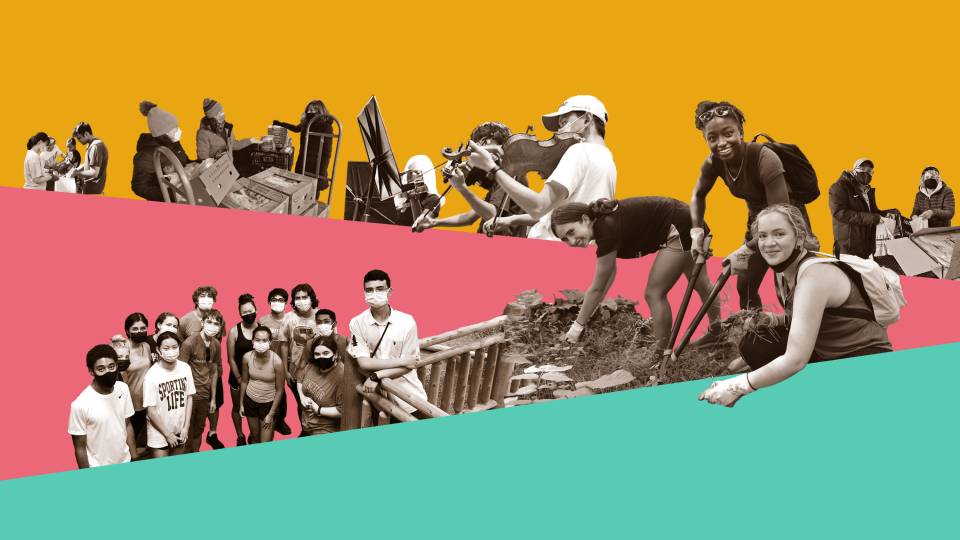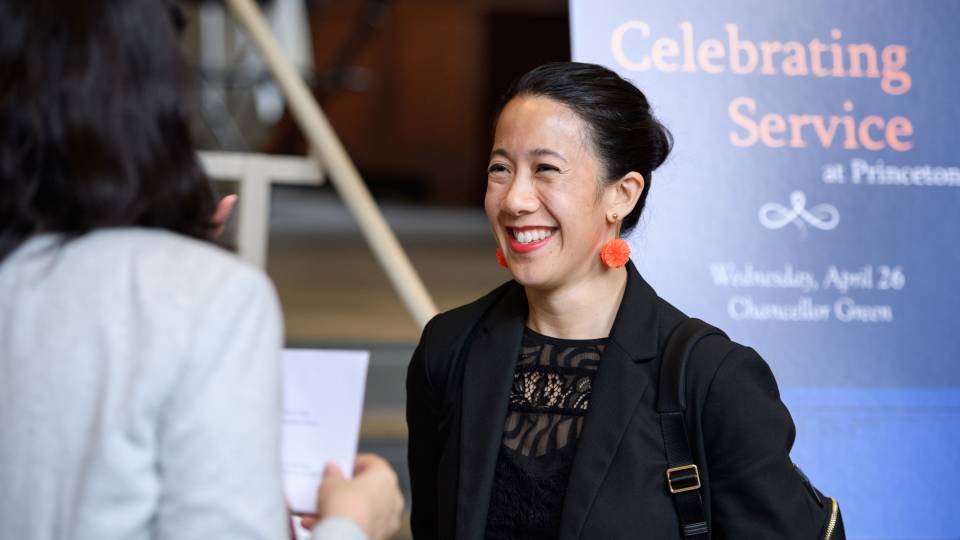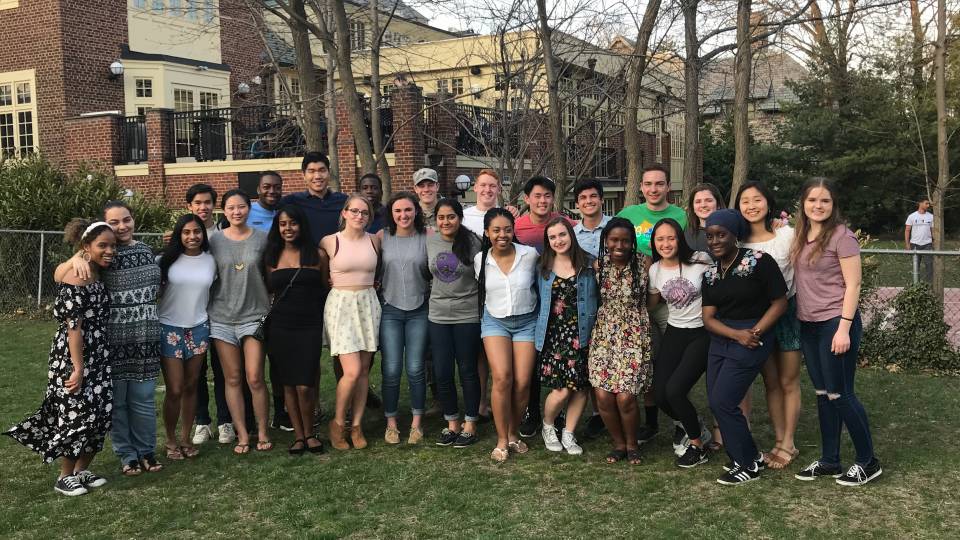Fifteen years ago, Princeton University created a center focused on supporting student service and civic engagement. Today, the Pace Center for Civic Engagement is thriving, helping Princeton students learn how to do service well and have a positive impact in the community.
On Thursday, March 24, the Pace Center celebrated its role in making service part of the Princeton student experience with a special gathering in Taylor Commons in the Frick Chemistry Laboratory. The celebration brought together center staff and students, campus and community partners, University leaders, founding donors, and new supporters. The event featured remarks from students, alumni, and key figures in the center's history, as well as a video highlighting its journey.
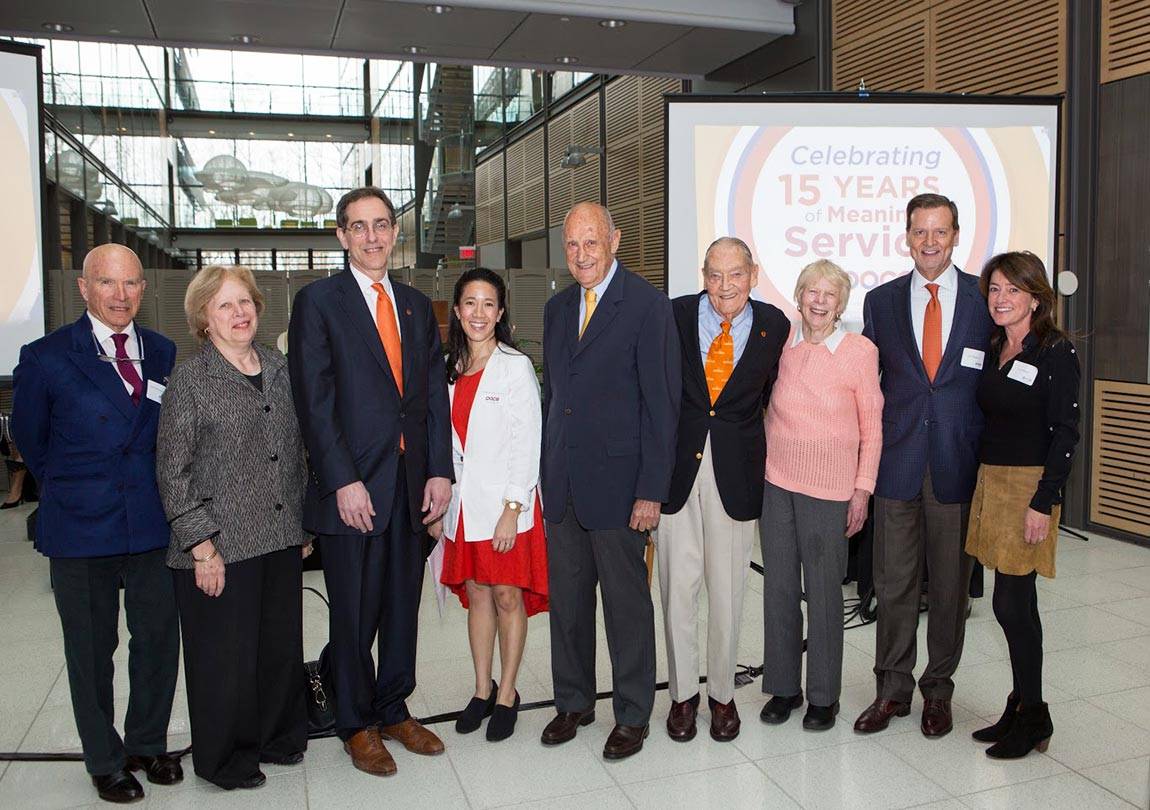
At the Pace Center for Civic Engagement's 15th-year anniversary celebration on March 24, were, from left: Pace Center founding supporter Carl Ferenbach of the Class of 1964; Professor of History Nancy Malkiel; President Christopher L. Eisgruber; Pace Center Executive Director Kimberly de los Santos; Pace Center founder Burton Malkiel, the Chemical Bank Chairman's Professor of Economics Emeritus; founding supporter John C. Bogle of the Class of 1951; Eve Bogle; John Bogle Jr.; and Lynn Bogle. (Photo by Andrea Kane)
"Having a commitment to service that is pervasive at this University is critical to what it is that Princeton does and the Pace Center has exemplified that commitment," said President Christopher L. Eisgruber. He underscored the value of connecting service and academics by describing the Service and Civic Engagement Self Study Task Force's vision for how service can provide a lens to the world, where service informs learning and learning informs service.
"I look forward to working with the Pace Center, and with all of you, to make service and the Pace Center even more central to what Princeton does and to ensure that the next 15 years for the Pace Center are even more dazzling and more brilliant than the 15 that we've just completed," Eisgruber said.
Founded in 2001, the Pace Center is named in honor of John H. Pace Jr. , Class of 1939, and his wife Augusta, who gave the foundational gift to create the center. Efforts to create the center first took shape as the University began to plan to celebrate its 250th anniversary. Burton Malkiel, the Chemical Bank Chairman's Professor of Economics, Emeritus, chaired the steering committee planning the 250th anniversary celebration and formally announced plans to create a center for service at the University's Charter Day in 1996.
"The Pace Center started with two ideas behind it: One was to provide stable and reliable funding for service and community outreach activities at Princeton," said Malkiel. "But even more important was to put service on the map as an essential learning experience and connect it to the curriculum so that it was not an add-on or feel-good activity where you simply check off the box, but rather that service and learning were focused as an embedded part of a Princeton education."
He pointed to the center's emphasis on reflection in its programs as a vital part of service and civic engagement and increased participation in service-related courses with programs like the Community-Based Learning Initiative as measures of success.
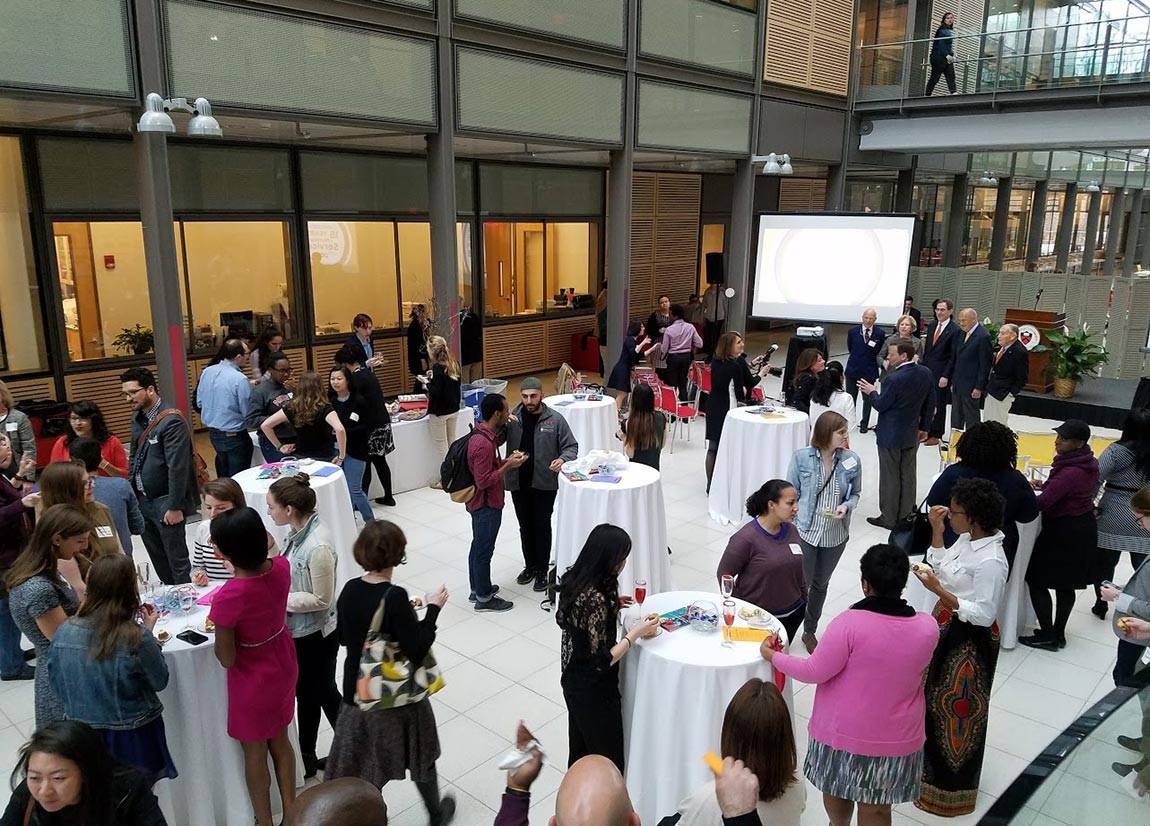
Attendees celebrate the Pace Center's role in making service part of the Princeton student experience at an event in Taylor Commons, Frick Chemistry Laboratory. (Photo by Gwen McNamara, Pace Center for Civic Engagement)
Students shared how their involvement with the center shaped their experiences at Princeton.
Freshmen Blaykyi Kenya and Nicholas Wu co-led a Breakout Princeton trip over spring break examining how the arts foster community engagement in Philadelphia and described how the experience led them to an important question: Why do we volunteer?
"Is it to make ourselves feel better in fulfilling some obligation?” asked Kenya. "Or is it truly because we care and feel we must give back? Can service be valuable to the volunteer? Or does that turn volunteerism into selfishness?"
"From what Blay and I have gathered, service can be enormously beneficial to the volunteer, but it often isn't and shouldn't be the motivation behind service," said Wu. "The intent should be to give back in a productive and genuine way, to have a positive impact on those who might benefit from it."
Senior Andrew Nelson talked about how volunteering with the Community House Preschool Program and tutoring with the Prison Teaching Initiative has influenced him.
"Service and civic engagement have consistently given me three crucial things: A sense of belonging in a greater community, a feeling of groundedness, and the opportunity to immerse myself in the work I care about," said Nelson, a recipient of the 2016 Moses Taylor Pyne Honor Prize. "And it is these qualities that I hope service may continue to bring, even after we leave campus."
Similarly, the Rev. Karen Hernandez-Granzen of the Westminster Community Life Center in Trenton, New Jersey, a long-time community partner with the Pace Center, shared how the service work students tackle through the center benefits the community. She described how students who take part in Community Action (CA), a service and community building program during orientation for incoming students with the Pace Center, contribute in important and tangible ways.
"With our organization the students have a huge impact in the community," she said. Hernandez-Granzen noted that the efforts included: "Helping us to reduce the school inequality between urban and suburban children by distributing free backpacks and school supplies, recruiting local barber shops and beauty salons to offer free haircuts, encouraging healthy exercise and healthy eating, and enrolling children in out of school programs and parents and family members in English classes.
"The students come with humble attitudes, ready to learn from community leaders," she added. "And we get to learn from them through their fresh eyes and probing questions."
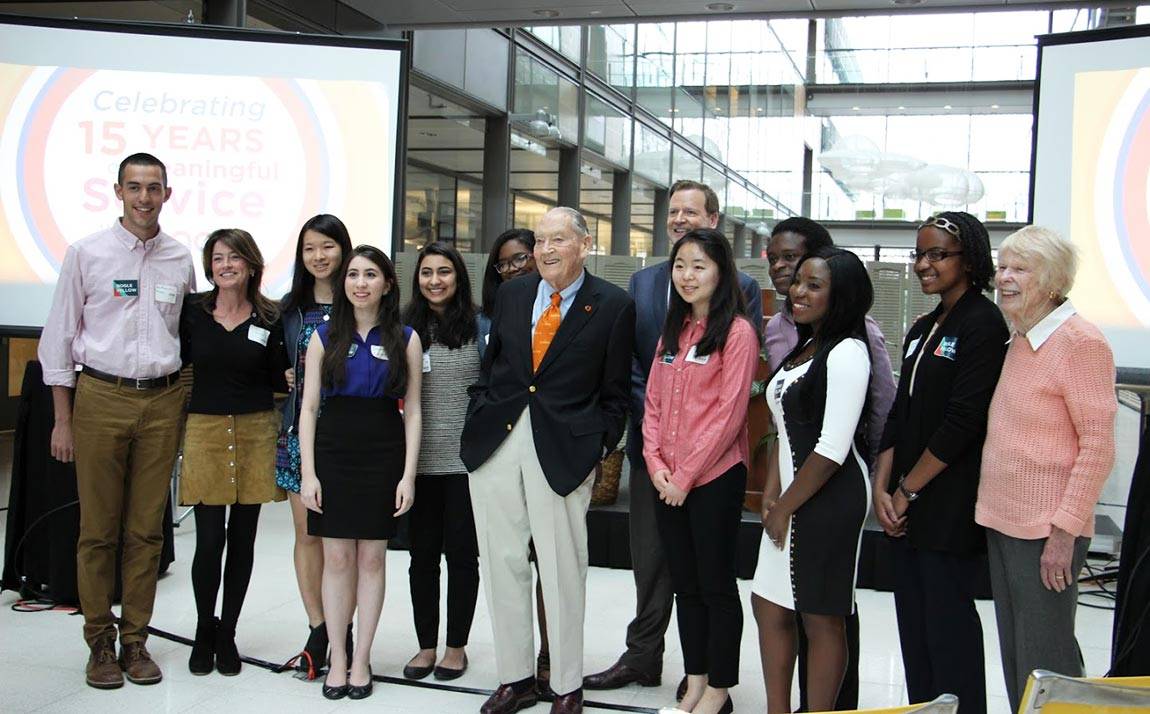
The inaugural cohort of John C. Bogle Fellows in Civic Service join John C. Bogle, John Bogle Jr. and Eve Bogle. (Photo by Helen Lin, Class of 2018)
The Pace Center also announced the inaugural cohort of nine freshmen taking part in the new John C. Bogle '51 Fellows in Civic Service program, which aims to broaden students' understanding of service and inspire students to contribute to the common good by learning through service.
"When the Pace Center was established 15 years ago, the heart of what we did was to help students do service," said Kimberly de los Santos, the John C. Bogle '51 and Burton G. Malkiel *64 Executive Director of the Pace Center, as she announced the cohort. "We will always do that, but as we go forward we also want to be more intentional about helping students hold service as a core value and to learn from service. The John C. Bogle '51 Fellows in Civic Service program is one way we aim to do exactly this."
The 2016 Bogle Fellows are: Belinda Azamati of Gaithersburg, Maryland; Jazmyn Blackburn of Brooklyn, New York; Tamia Goodman of Fayetteville, Georgia; Blaykyi Kenya of Takoradi, Ghana; Nergis Khan of Cedar Grove, New Jersey; Amber Lin of Edison, New Jersey; Nathaniel Moses of Chicago; Devina Singh of Dubai, United Arab Emirates; and Cara Yi of Fremont, California.
Fellows will develop a service or civic engagement-related project or internship during the spring semester, immerse themselves in the project or internship over the summer, and then connect their summer experiences to their academic work or career interests during the fall semester. The inaugural cohort's project ideas range from urban youth education and policy in Washington, D.C.; telemedicine and its accessibility and impact in northern New Jersey; sustainable beekeeping as an alternative to copper mining; and immigration policy and advocacy in California.
The Bogle Fellows program was made possible by a gift from John C. Bogle Jr. and his wife Lynn, in honor of Bogle Jr.'s father, John C. Bogle '51, founder of The Vanguard Group investment management company and one of the founding supporters of the Pace Center.
"The idea of giving back, especially at Princeton University, has been a major priority of my adult life," said Bogle Sr. "I am thankful that I had the opportunity to get in on the ground floor of the Pace Center. My goal of leaving a legacy for future young people is an important part of what inspires me."
He encouraged the new Bogle Fellows to hold on to their idealism as they pursue their projects and life at Princeton and beyond. "Thank you John and Lynn for doing this wonderful thing in my name," he added. "Princeton truly is the single most important thing to me outside of my family. Three cheers for Old Nassau!"
See the center's 15th anniversary timeline.
